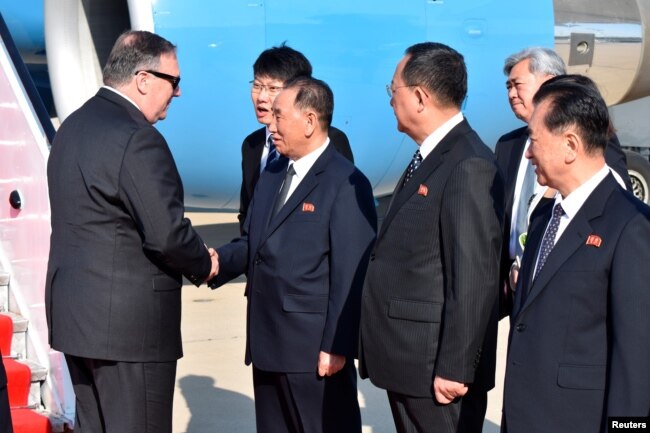
WHITE HOUSE — White House officials said conversations underway this week in Panmunjom, Singapore and New York City are focused on denuclearization of North Korea ahead of a planned June 12 summit between U.S. President Donald Trump and North Korean leader Kim Jong Un.
“That’s what these ongoing conversations taking place now will be centered on, as well as the summit that would take place in Singapore,” White House press secretary Sarah Sanders told reporters Wednesday.
The discussions of “total denuclearization of the peninsula” do not extend to U.S. weapons systems, Sanders said.
North Korea is estimated to have more than a dozen nuclear weapons.
Submarines, bombers
The United States’ defense umbrella covering South Korea includes nuclear-armed submarines and strategic bombers capable of carrying nuclear bombs that are not based on the peninsula.
According to Sanders and others, this week’s discussions with North Korean officials are being held with the June 12 date in mind for the Trump-Kim summit.
“We’ll be ready, if it does [occur] on June 12,” Sanders said during a regular news briefing. “And if it’s not, then we’ll be ready if it takes place on July 12.”
U.S. Secretary of State Mike Pompeo is meeting in New York with a top North Korean general for preparatory talks for the summit.
Kim Yong Chol, who arrived in New York on Wednesday, is the vice chairman of the powerful Central Committee and North Korea’s former spy chief. He and Pompeo have met twice previously in Pyongyang.
The State Department has said Pompeo will be in New York through Thursday, so the two men are expected to have more than one meeting.
An advance team, led by White House Deputy Chief of Staff Joe Hagin, met with the North Korean team in Singapore on Wednesday, and expects to meet again Thursday, according to the White House.
“We also have reports back from the DMZ,” Sanders said, referring to the Korean Demilitarized Zone. “The U.S. delegation, led by Ambassador [to the Philippines] Sung Kim, met with North Korean officials earlier today, as well. And their talks will continue. So far, the readout from these meetings has been positive, and we’ll continue to move forward in them.”
Cancellation, then reversal
Trump sent a letter last week to Kim Jong Un, saying the June 12 summit in Singapore would not happen because of what he said was “tremendous anger and open hostility” shown in a statement from Pyongyang. The U.S. president reversed his stance following a subsequent quick and conciliatory statement from North Korea expressing Kim’s “fixed will” for his meeting with Trump to occur.
“North Korea remains our most imminent threat,” Navy Admiral Harry Harris, the outgoing U.S. Pacific Command commander, said during a change of command ceremony in Hawaii on Wednesday.
“A nuclear-capable North Korea with missiles that can reach the United States is unacceptable,” Harris added.
VOA’s Margaret Besheer at the United Nations, Nike Ching at the State Department and Bill Gallo in Honolulu contributed to this report. | voanews

